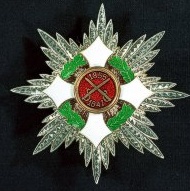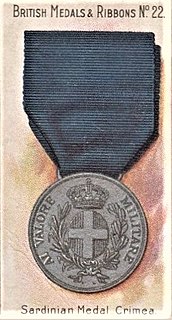 W
WThe Allied Victory Medal was the Italian variant of the Victory Medal of other nations. It was established by royal decree number 1918 on 16 December 1920, which granted it to all who had been awarded the "fatiche di guerra" distinction by royal decree number 641 of 21 May 1916, or who had served for four months in an area under the jurisdiction of the armed forces and who had been mobilised and directly worked with the operational army.
 W
WThe Colonial Order of the Star of Italy was founded as a colonial order of knighthood on 18 June 1914 by King Victor Emmanuel III, to reward soldiers deployed to the colony of Libya. The order had fallen into abeyance by 1943, when Allied forces conquered the colonies of Italian North Africa.
 W
WThe Commemorative Medal for the Italo-Austrian War 1915–1918 was the Italian campaign medal for World War I.
 W
WThe Commemorative Medal for the Italo-Turkish War 1911–12 was a medal instituted by Vittorio Emanuele III of Savoy on 21 November 1912 for all civilian personnel and Italian and colonial troops who fought against the Ottoman Empire in the Italo-Turkish War of 1911 to 1912.
 W
WThe Maurician medal is an honorary degree granted to a soldier, after 50 years of service in the Italian army. This medal was established by Carlo Alberto di Savoia, on 19 July 1839 on decree of the Regie Magistrali Patenti, with the name of "Maurician Medal to the Military Merit of Ten Lustrums". It became official with royal decree of 21 December 1924. The "Maurician Medal to the Military Merit of Ten Lustrums" would then be replaced, by the law n. 203 of 7 May 1954, with the "Maurician Medal to the merit of ten lustrums of military career".
 W
WThe Military Order of Italy is the highest military order of the Italian Republic and the former Kingdom of Italy. It was founded as the Military Order of Savoy, a national order by the King of Sardinia, Vittorio Emanuele I, Duke of Savoy in 1815. The order is awarded in five degrees for distinguished wartime conduct of units of the armed forces or individual personnel that has "proven expertise, a sense of responsibility and valour."
 W
WThe Military Order of Savoy was a military honorary order of the Kingdom of Sardinia first, and of the Kingdom of Italy later. Following the abolition of the Italian monarchy, the order became the Military Order of Italy.
 W
WThe Patriot’s Certificate is a document that was given to the partisans of the Italian resistance movement during and after the Second World War, firmed by the British field marshal Harold Alexander, commander of Allied forces in Italy, attestating the active collaboration with the Allied forces against the Axis forces.
 W
WThe Sardinian Crimean War Medal or, more formally, the silver medal for Military Valour for the Eastern Expedition 1855-1856 was a gallantry medal awarded by King Victor Emmanuel II of Sardinia for bravery during the Crimean War (1855-1856) against the Russian Empire. It is a variant of the Sardinian Medal of Military Valor.
 W
WThe military Order of Vittorio Veneto was founded as national order by the fifth President of the Italian Republic, Giuseppe Saragat, in 1968, "to express the gratitude of the nation" to those decorated with the Medal and the War Cross of Military Valor who had fought for at least six months in World War I and earlier conflicts.